Related Research Articles

An epigram is a brief, interesting, memorable, sometimes surprising or satirical statement. The word derives from the Greek ἐπίγραμμα. This literary device has been practiced for over two millennia.

Marcus Valerius Martialis was a Roman poet born in Hispania best known for his twelve books of Epigrams, published in Rome between AD 86 and 103, during the reigns of the emperors Domitian, Nerva and Trajan. In these poems he satirises city life and the scandalous activities of his acquaintances, and romanticises his provincial upbringing. He wrote a total of 1,561 epigrams, of which 1,235 are in elegiac couplets.

Guy Carleton, 1st Baron Dorchester, known between 1776 and 1786 as Sir Guy Carleton, was a British Army officer, peer and colonial administrator. He twice served as Governor of the Province of Quebec, from 1768 to 1778, concurrently serving as Governor General of British North America in that time, and again from 1785 to 1795. The title Baron Dorchester was created on 21 August 1786.
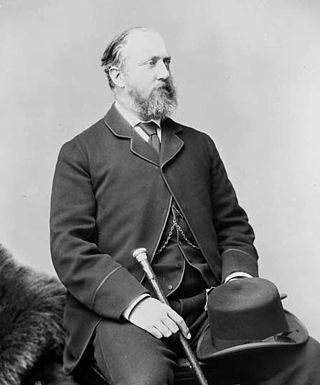
Frederick Arthur Stanley, 16th Earl of Derby, styled as Hon. Frederick Stanley from 1844 to 1886 and as The Lord Stanley of Preston between 1886 and 1893, was a Conservative Party politician in the United Kingdom who served as Colonial Secretary from 1885 to 1886 and Governor General of Canada from 1888 to 1893. An avid sportsman, he built Stanley House Stables in England and is famous in North America for presenting Canada with the Stanley Cup, the championship trophy in ice hockey. Stanley was also one of the original inductees of the Hockey Hall of Fame.

General Sir Gordon Drummond, GCB was a Canadian-born British Army officer and the first official to command the military and the civil government of Canada. As Lieutenant Governor of Upper Canada, Drummond distinguished himself on the Niagara front in the War of 1812 and later became Governor-General and Administrator of Canada.

John Butler was an American-born military officer, landowner, colonial official in the British Indian Department, and merchant. During the American Revolutionary War, he was a prominent Loyalist who led the provincial regiment known as Butler's Rangers. Born in Connecticut, he moved to New York with his family, where he learned several Iroquoian languages and worked as an interpreter in the fur trade. He was well-prepared to work with the Mohawk and other Iroquois nations who became allies of the British during the rebellion.
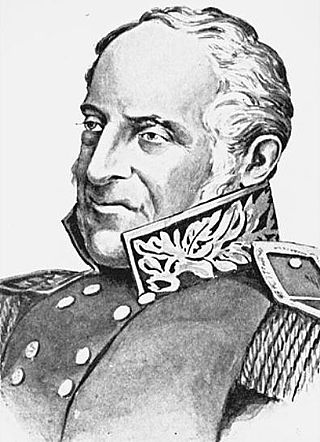
General Sir Roger Hale Sheaffe, 1st Baronet was a Loyalist General in the British Army during the War of 1812. He was created a baronet in 1813 and afterwards served as Commander and acting Lieutenant Governor of Upper Canada. There is conflicting information to statements regarding his military accomplishments (1812) in the "Letters of Veritas" in and around page 50.

Sir Francis Godschall Johnson was a Canadian office holder. He was appointed Lieutenant Governor of Manitoba on April 9, 1872, but had his commission revoked before he was sworn in. In 1889, he was appointed the 4th chief justice of the Superior Court of Quebec.

Brigadier-General Sir John Johnson, 2nd Baronet was an American-born military officer, magistrate, landowner in the British Indian Department who fought as a Loyalist during the American Revolutionary War. He was the son of Sir William Johnson, 1st Baronet, who was the first British Superintendent of Indian Affairs. He inherited his father's baronetcy and estate in 1774.
Major-General Henry Patrick Procter was a British Army officer who served in the Canadas during the War of 1812. He is best known for being decisively defeated in 1813 by American forces, which left the western portion of Upper Canada under U.S. control. Procter is regarded by numerous commentators as an inept leader who relied heavily on textbook procedure. His "going by the book" is attributed to his lack of any combat experience before coming to Canada.

The Honourable Charles Herbert Mackintosh was a Canadian journalist and author, newspaper owner and editor, and politician. He served as mayor of Ottawa from 1879 to 1881, represented the City of Ottawa as a Liberal-Conservative Member of Parliament in the House of Commons of Canada from 1882 to 1887, and from 1890 to 1893, and served as Lieutenant Governor of the North-West Territories from 1893 to 1898, as it underwent a major transition toward responsible government.
General Thomas Carleton was an Irish-born British Army officer who was promoted to colonel during the American Revolutionary War after relieving the siege of Quebec in 1776. After the war, he was appointed as Lieutenant-Governor of New Brunswick, and supervised the resettlement of Loyalists from the United States in the province. He held this position until his death, although he was absent in England for the last fourteen years of his tenure, refusing orders to return in a dispute about seniority.
General John Vincent (1764–1848) was the British commanding officer of the Niagara Peninsula in Upper Canada when the United States attacked in the spring of 1813. He was defeated at the Battle of Fort George but was able to rebound and establish the new lines at Burlington Heights. He directed the campaign during the summer and fall that eventually forced the Americans to abandon the Niagara area in December 1813, thanks in large part due to his victory over the Americans at the Battle of Stoney Creek. Due to illness he was replaced by General Phineas Riall, though of the several officers of the 49th Regiment who reached high command during the War of 1812, Vincent was the longest-serving of them. British and Canadian accounts of the War give the impression of a modest, well-liked and generous officer, who gave whatever help he could to other commanders. From 1814, he had held the sinecure post of Lieutenant-Governor of Dumbarton Castle.
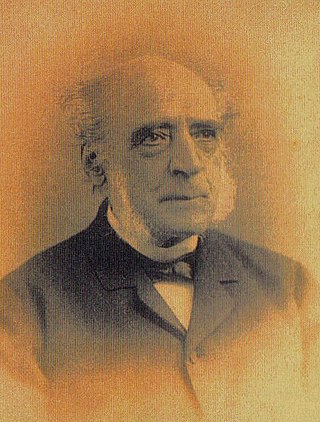
Sir William Collis Meredith, was Chief Justice of the Superior Court for the Province of Quebec from 1866 to 1884. In 1844, he was offered but refused the positions of Solicitor General of Canada and then Attorney-General for Canada East - the latter position he turned down again in 1847. In 1887, he was one of the two English-speaking candidates considered by the Liberals for the role of Lieutenant Governor of Quebec. The home he commissioned and lived in at Montreal from 1845 to 1849 still stands today, known as the Notman House.
Louis de Watteville was a Swiss mercenary in Dutch and British service. He became a major general in the British Army, and fought in the Napoleonic Wars and the War of 1812.
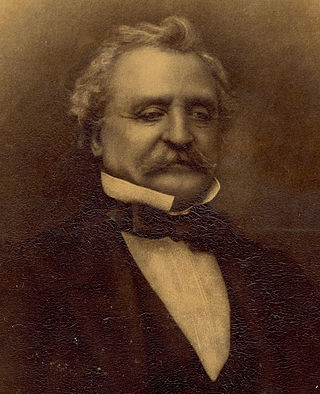
Robert Unwin Harwood was the last seigneur of Vaudreuil, commanding officer of the Vaudreuil Militia, and for thirty years a political figure in Lower Canada and Canada East.

Antoine Chartier de Lotbinière Harwood was a Quebec lawyer and political figure. He represented Vaudreuil in the Legislative Assembly of Quebec from 1867 to 1871.
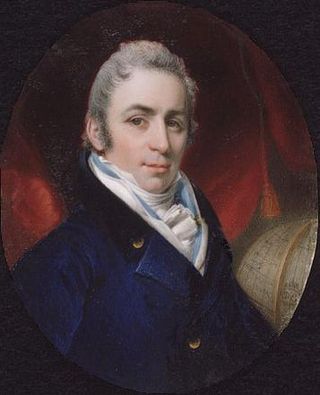
Lt.-Colonel Joseph Bouchette was the Canadian Surveyor-General of British North America. His book, Topographical Description of the Province of Lower Canada was published at London in 1815 and also translated into French. It contained the sum knowledge of the territory at that time. The township of Bouchette, Quebec, was named for him. During the War of 1812 he raised and commanded the Quebec Volunteers. In 1813, he was gazetted Lt. Colonel on the Staff of Governor-General Sir George Prévost.

Jacob Æmilius Irving was a soldier and political figure in the Province of Canada. He served as a member of the Legislative Council of the Province of Canada from 1843 to 1856.
Richard Netterville was an Irish barrister and politician of the Elizabethan era. He was noted for his willingness to oppose the Crown, especially on its taxation policies, and as a result, he was imprisoned several times.